The Checker Maven
The World's Most Widely Read Checkers and Draughts Publication
Bob Newell, Editor-in-Chief
Published each Saturday morning in Honolulu, Hawai`i
Contests in Progress:
Checker School: Cowie's Position

While the photo above certainly depicts an interesting position (although one which we're most unlikely to attempt ourselves), our title, and today's lesson in our ongoing Checker School series, refers to a position of a much different nature.
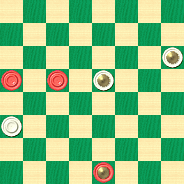
WHITE
White to Play and Win
W:WK12,K15,21:B13,14,K31.
It's three against three, but White has two kings and seemingly the upper hand. But the twists and contortions necessary to score the win will require much flexibility of thought. See if you can master this surprisingly intricate position; but don't get tied up in knots; clicking on Read More will definitely ease the strain by bringing you the full solution, a sample game, and Ben Boland's detailed notes and commentary.![]()
Tombstones for Tyros

In this installment from Willie Ryan's classic Tricks Traps & Shots of the Checkerboard, Willie pulls no punches in his characterization of the lions devouring their weaker prey. Let's listen in as Willie speaks.
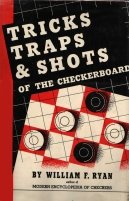
"The Cross opening is a perpetual favorite with all classes of players. For some unexplainable reason, it is infested with more early pitfalls than any other opening on the board. Here, in one concise arrangement, you will find four of the best-known and most commonly employed 'shockers' that experienced players are constantly using to slay the innocents.
| 11-15 | 23-18 |
| 8-11 | 27-23 |
| 4-8 | 23-19 |
| 9-14---A | 18-9 |
| 5-14 | 22-17 |
| 15-18 | 26-22 |
| 11-15---B,C | 17-13 |
| 7-11 | 13-9 |
| 6-13 | 24-20 |
| 15-24 | 22-6 |
| 1-10 | 28-19 |
| 11-15 | 31-26 |
| 15-24 | 26-22 |
| 13-17---D | 22-13 |
| 2-6---E. |
See the diagram.
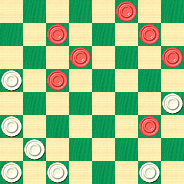
WHITE
White to Play and Win
W:W13,20,21,25,29,30,32:B3,6,8,10,12,14,24.
A---Another early demise follows 9-13, which loses as follows: 9-13, 26-23, 6-9, 30-26, 9-14, 18-9, 5-14, 32-27, 1-5, 19-16, 12-19, 23-16, 11-20, 22-17, 13-22, 25-4, and white wins.
B---If 18-23 is employed, then counter with 19-15, 10-19, 24-15, 11-18, 22-15, 14-18, 31-27, 7-10, 17-14. At this stage, 10-17, 21-14, 6-10 is drawable, but 10-19 allows the shot by 14-10, 6-15, 25-22, 18-25, 27-4, with which white wins.
C---A natural-looking move is 11-16, but it cracks up quickly by 22-15, 16-23, 31-27, 10-19, 17-10, 7-14, 27-9, 6-13, 24-15, and white wins.
D---This has been erroneously rated a losing move, but it produces a draw as shown in Note E. The accepted draw moves at this point are: 14-17, 21-7, 3-10, 22-17, 13-22, 25-18, 8-11, 29-25, 2-6, 25-22, 6-9, 22-17, 24-28, 17-13, 10-15, 13-6, 15-22, 6-2, 11-15, 2-7, 15-18, 7-10, 18-23, 10-15, 22-26. Andrew Anderson.
E---This is the real loser, since it allows the shot which follows. Black can still draw at E by playing: 14-18, 25-22, 18-25, 29-22, 8-11, 13-9 (best chance), 10-15, 9-5---F, 15-19, 5-1, 19-23, 1-5, 11-15, 5-9, 3-7, 9-13, 12-16, 20-11, 7-16, 13-17, 15-19, 22-18, 24-27; a draw. Wm. F. Ryan.
F---If 22-17 is used, follow with: 15-19, 17-13, 19-23, 9-6, 2-9, 13-6, 24-27, 6-2, 27-31, 2-6, 11-15, 6-10 (21-17, 23-26, 30-23, 31-26 ends in a draw), 3-8, 10-26, 31-22, 32-27, 8-11, 27-23, 12-16, 30-25, 22-29, 21-17; a draw. Wm. F. Ryan."
You needn't have this problem become your tombstone; avoid the hungry lions by clicking on Read More to see the short and snappy solution.![]()
With Deliberate Speed

Today's speed problem is a little different; it's really not a "speed" problem per se, in that it needs to be solved in seconds. Instead, we present a problem that's a good deal harder than the usual "find the tactics" speed problem, though it really isn't so difficult as problems go.
Your challenge in this month's speed offering is to find the solution within the "regulation" five minute time limit. Are we perhaps being too easy on you? Only you can decide; try out the problem, and then click on Read More to see the solution and a sample game which leads to the problem position. Make haste slowly!
![]()
Three by Mac
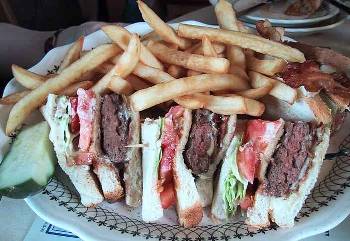
For better or worse, today's Checker School episode isn't about a three-decker cheeseburger put out by a fast food establishment. Instead, it's a triple-decker set of positions by J. B. Macindoe, a fascinating progressive endgame study.
First, try the original:
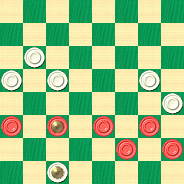
BLACK
Black to Play and Win
B:W24,20,19,17,13,K3:B12,K11,10,9,6,5.
If you are really good and you got it right, you went to this second configuration at some point:
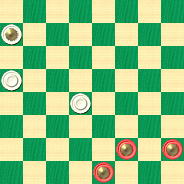
BLACK
Black to Play and Win
B:WK28,20,15:BK6,K5,K2.
And if you stayed on track (a bit easier this time), you came up with the following third situation:
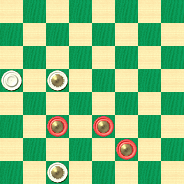
BLACK
Black to Play and Win
B:W20,K19,K3:BK11,K10,K6.
We suggest that in solving the problem, you start with the first diagram; if that's (as we expect) a tough piece of meat, try the second diagram; and if you can't slice that particular piece of cheese, see if you can shred the lettuce in the third diagram. But to digest the solutions, no secret recipes are needed; clicking on Read More will serve up the answers.![]()
Better Than First

What can be better than first? You'll know the answer when you solve this delightful miniature by R. Holding.
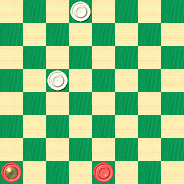
BLACK
Black to Play and Win
B:W31,19:BK4,2.
Can you finish "better than first"? Win the prize by clicking on Read More for the solution and a more detailed explanation of today's theme. (As with most miniatures, we recommend you try to "sight solve" without moving pieces on a board, as a way to develop visualization skills.)![]()
Different Strokes

Normally, on the first Saturday of the month we present one or more "speed" problems, in which you get to race against our unforgiving Javascript clock. We're going to break the routine this month, and from time to time in the future, to present a "stroke" problem instead.
Our large and varied readership, predictably, has large and varied tastes. Some people love speed problems, while others don't; and the same is true of stroke problems, hard problems and easy problems, and on and on.
Presenting variety, and something for everyone at least from time to time, are our goals in presenting our weekly column. So, let's mix things up with a stroke problem that is without any doubt on the easier side.... after all, it's the beginning of March, and in the U.S. at least we'd best be thinking about working on income tax returns.... we do need a bit of a break from time to time.
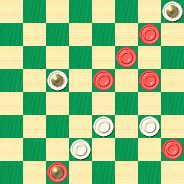
WHITE
White to Play and Win
W:WK4,K14,23,24,26:B8,11,15,16,28,K30.
By all means, don't stroke out if you can't find the solution! Instead, click on Read More for instant relief.![]()
Ace in the Hole
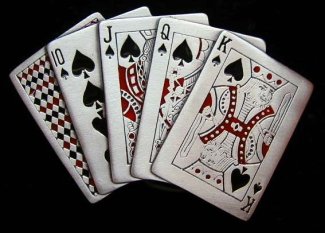
Today we bring you a checker problem that's a little bit easier than some others; it's called "The Ace in the Hole" and is by E. A. Jones. It's really more in the nature of a study or a lesson.
In the position below, forces are even, but the Black king seriously threatens the two White men. To get a draw, White will indeed need an "ace in the hole." If you were a betting person, which side would you take?
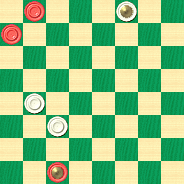
WHITE
White to Play and Draw
W:WK3,17,22:B1,5,K30.
Find out for yourself by solving the problem; is there an Ace in the hole or just a losing low card? A sure bet, though, is clicking on Read More; that's guaranteed to bring you the answers.![]()
Always Read the Fine Print

Preparing articles for our ongoing Checker School series is something we find fascinating, if a bit time-consuming; the hours rush by almost unnoticed. We first find an interesting classic position, usually, as is the case today, from Boland's Famous Positions in the Game of Checkers. Then we work through the position, games, and notes, knowing that if we ourselves can understand the play, the average checkerist will easily do so as well. Finally we check the solutions with the computer--- interesting discoveries are often made that way--- and add our own explanatory notes, amplifying on those things which Mr. Boland found obvious but we, with our far lesser skills, did not.
The offering below is one of those in which you really must read "the fine print" to benefit fully. Mr. Boland's notes were a bit less complete than usual, and there is much worthwhile play and answers to puzzling questions in the variants and branches. Let's look at the problem:
BLACK

WHITE
White to Play and Win
W:W29,14,K2:B8,5,1.
White clearly has the upper hand, but how to stop the Black man on 8 from crowning and evening things up--- without releasing the men in the double corner? Finesses abound in this position and it takes precise play to gain the win.
Solve it yourself, and then be sure to read the fine print, easily accessible by clicking on Read More.![]()
The Block Game

It's been a little while since we searched our admittedly disordered and dusty library for a Tom Wiswell gem, and we've frankly missed the pleasure and enjoyment that his problems infallibly deliver. Finally, this week we did a little reorganizing of our offices, and we happily came across a fine (and long-overdue) example of Mr. Wiswell's incomparable art.
Here, then, is a situation which is based on actual play.
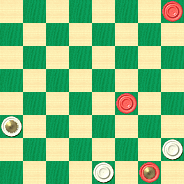
WHITE
White to Play and Win
W:WK21,28,31:B4,19,K32.
The title of our article, which is congruent with Mr. Wiswell's title for the problem, is a pretty obvious hint. But nonetheless, the problem isn't necessarily all that easy.
Spend a little time trying to stack up the solution, but if your mental processes are blocked, clicking on Read More will cause the answers to tumble into your lap.![]()
Two Little Cuties

For our February speed problem offerings, we present two little cuties; a pair of rather easy problems with charming solutions, at least in our humble opinion. We hope you agree. Give them a try; but remember, our relentless timer won't allow you to solve them at a crawl! Fifteen seconds each is all the time you have.
Speed Problem One (rather easy)
Speed Problem Two (easy enough)
However, if you don't solve them in time there is no need to do a diaper change--- clicking on Read More will bring you the solutions without fuss, muss, or mess.![]()
The Checker Maven is produced at editorial offices in Honolulu, Hawai`i, as a completely non-commercial public service from which no profit is obtained or sought. Original material is Copyright © 2004-2024 Avi Gobbler Publishing. Other material is the property of the respective owners. Information presented on this site is offered as-is, at no cost, and bears no express or implied warranty as to accuracy or usability. You agree that you use such information entirely at your own risk. No liabilities of any kind under any legal theory whatsoever are accepted. The Checker Maven is dedicated to the memory of Mr. Bob Newell, Sr.

